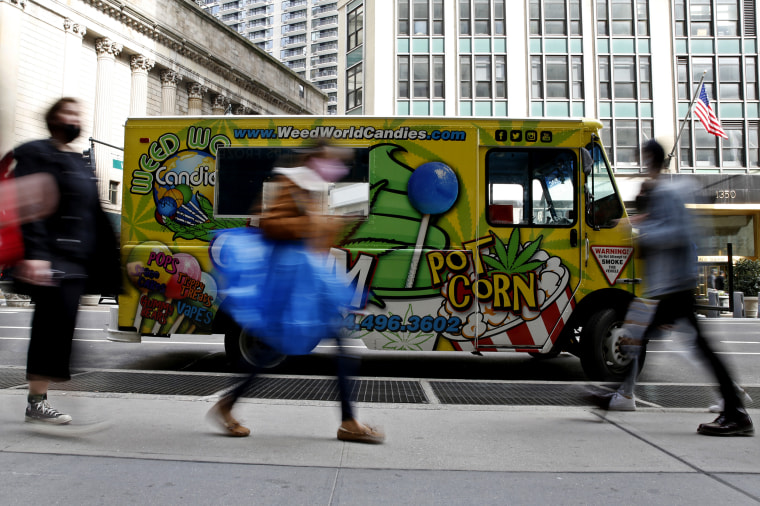New York Governor Andrew Cuomo signed a bill Wednesday legalizing adult recreational marijuana in the state, with the potential to generate $350 million a year in tax revenues and up to 60,000 new jobs, according to estimates by his office.
The legislation “embraces an industry that will grow the Empire State's economy, and prioritizes marginalized communities so those that have suffered the most will be the first to reap the benefits," Cuomo said in a statement.
Eventually the legal cannabis program could generate up to $3.5 billion a year in economic activity for the state, his office previously estimated.
Those numbers may sound elevated — but not in comparison to more mature markets.
Colorado legalized marijuana in 2012, and with less than one-third of the population of New York saw annual sales last year of $2.2 billion. California, which has twice the population of New York, saw $4.4 billion.
“Any time you're starting a market from scratch, it takes time to set up,” said Laura Schultz, executive director of research at Rockefeller Institute of Government, a public policy think tank. “With the projections that I've been seeing, it's going to be about $1.2 billion in the first year of recreational sales, and perhaps growing into about $4 billion or more in about four or five years.”
The new law would create state licenses for farmers, distributors, makers and retail locations where users could consume product on site, such as in lounges.
Law enforcement won’t be able to arrest or prosecute individuals for possession of marijuana up to 3 ounces. The regulation also calls for an automatic review of those with low-level marijuana related convictions, and expunging the charges from their records. That would go a step beyond previous efforts. In 2019, after Gov. Cuomo signed a law removing criminal penalties for minor possession, over 150,000 people had their previous marijuana convictions sealed.
The new law aims to address some of the economic imbalances and harms created by marijuana enforcement. About 40 percent of the revenue would go to a new social equity fund for programs that help address those harmed by marijuana arrests. Nonprofits and local governments will be able to apply for funding for programs like job placement, housing, and legal barriers to reentry.
While in the works for years, the push comes as Cuomo faces calls to resign after a series of sexual misconduct allegations, and is seen as an olive branch to progressives, among the loudest calling for him to go.
It could be a boon for state tourism and leisure industries, ravaged by shutdowns, giving tourists another reason to visit.
The law makes New York the 15th state to legalize recreational marijuana, and follows recent legalization by its neighbor New Jersey.
But before the first recreational sale is made in New York, an entire regulatory framework and supply system needs to be created. Experts estimate that could take at least 18 months.
While some conservatives support the measure around medical aid, personal choice, and freeing up law enforcement resources, others have highlighted driver safety, health, and “gateway” drug concerns as ongoing concerns.
Supporters heavily touted the business benefits, seen as an easier pitch to some of those potential opponents in a time when state revenues have been negatively impacted by the pandemic.
The loosening could be a boon for state tourism and leisure industries, ravaged by shutdowns, giving tourists another reason to visit.
However, the entire model could be threatened if marijuana is legalized on a federal level, opening up the possibility of interstate commerce and national competition.
“If federal marijuana or cannabis policy changes, the benefits of a self-contained industry within a state can evaporate,” Schultz said.

